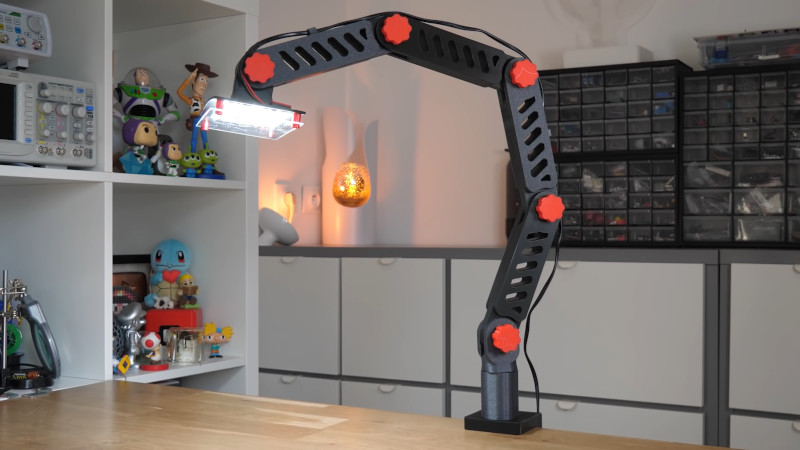As far as light fittings go, store bought is fine, but it’s hard to beat something you’ve built yourself from the ground up. [Heliox] demonstrates this well, with a 3D-printed workshop lamp that looks the business and is functional, too.
The lamp has plenty of neat design touches that speak to [Heliox]’s experience in the 3D printed arts. The articulating arms are modular, and feature integrated cable guides. The lamp base features nuts inserted mid-print for easy assembly, and the swivel is actually a two-piece mechanism printed as a single assembly. The table clamp uses a large screw, and the benefit of 3D printing means its easy to customise to suit any individual table. Using black and orange filaments gives the lamp a proper industrial look, and the bright LED strips are perfect for illuminating a bench for fine detailed work.
It’s a great addition to [Heliox]’s workspace, and the tall articulated design means it can cast light without getting in the way of what you’re doing. We’ve featured her work before, too – like this glorious infinity cube. Video after the break.
















What in the hell is she saying? It’s like she’s speaking a whole nother language! Anyway an interesting addition would be putting cables inside the arm segments so when you turn the screws they automatically change the segments inclination, of course her method is simpler and without cutouts for cables probably stronger too.
It’s French mon ami.
I speak french but still when I hear a lady with her accent and speaking french I think ‘encore une fois’. That aside I am printing this right away. I love french hackers their stuff is always cool.
Hairy pits, Coco Chanel and 3D printed lamps, vive la difference.
I always think of Futurama’s reference to French being a long-dead language.
Click for subtitles (CC or closed caption) and then Settings to translate to your lingo.
Otherwise watch carefully at her expressions and actions and it will be totally self explanatory.
Fantastique!!
Really…
Everybody has their own thing. Did they spend YOUR money?
This version has a nice simplicity, but a for a future version, perhaps try to imagine a way to push a single button to loosen all the joints at once, then release to tighten them all at once. Maybe a bowden-cable mechanism may help.
I really like this idea +1
It’s a nice idea which can be taken further. It’s a missed opportunity not routing the cable inside the bars.
I think I like really long metal swan neck bendy lamps better, these can be angled in any way to hit your work piece at just the right angle, and two of them avoids annoying shadows.
I’ve made two 60cm long swan-necked led lights with 3D printed armature to hold a small philips led light. With table clamp. Easily ordered form your favorite Asian webshop.
I really wished she would add dedicated English subtitles, the video is pretty useless in French…
Click on CC icon to activate closed captions. Click on settings icon. Click on “Subtitles/CC.” Click on “auto-translate.” Select language from list.
Not totally useless: only more useful to French versed people: time to learn another language!
you can hear doooze volts = 12V , xx amperes , else no other words needed, you get the idea from watching the video. If you ever connected a LED to a battery then you now all what she talks there allready
Thanks for posting a video in French! I learned a long time ago but don’t get to use it much, so I always appreciate a little brush-up. The lamp is cool too.
As for not routing the power cable internal to the arm members, I think her build is more appropriate for the materials being used. There would be reliability issues where that type of vinyl insulation is used. Also, wire intended to be flexed is typically many strands of small gage. See the UL wire ‘style’ guide(s) for bend radius and other ratings.
How do we find the plans to build some of her stuff?
Start playing the video, click the Youtube (watch on Youtube) link, then look in the description below the video. There are lots of links in hers, but the one after “STL” seems most relevant in this particular case.